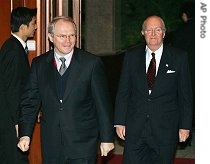-
(单词翻译:双击或拖选)
By Roger Wilkison
Beijing
19 December 2006
The chief U.S. negotiator at the six-party talks in Beijing that are aimed at persuading North Korea to abandon its nuclear weapons program says there were no breakthroughs after his first bilateral1 meeting with his North Korean counterpart. From the Chinese capital, Roger Wilkison reports on the second day of the latest round of negotiations2.
 |
| Christopher Hill, (l), with US Ambassador to China Clark Randt, arrives for a banquet after second day of talks on N. Korea's nuclear program, 19 Dec. 2006 |
Hill and negotiators from China, Japan, Russia, and South Korea are trying to get North Korea to implement4 a pledge it made under a joint5 statement by the six in September 2005 to scrap6 its nuclear weapons in exchange for aid and security guarantees.
"We do not have any breakthroughs to report," he said. "I would say though that it was a substantial discussion where we went through some really specific ideas as to how to get going on implementing7 the joint statement."
North Korea says it will not consider getting rid of its nuclear-weapons program until the United Nations lifts sanctions on the reclusive communist state that were imposed after North Korea conducted a nuclear test in October. It also wants the United States to end financial restrictions8 Washington imposed in late 2005 on a Macau bank that U.S. officials say helped Pyongyang with counterfeiting9 and money-laundering activities.
North Korean and U.S. officials met on the sidelines of the negotiations to discuss that issue, but the U.S. team leader said resolving the financial restrictions issue is a long-term process.
Hill, meanwhile, called on host China, ostensibly an ally of North Korea, to play a bigger role in pushing the North Koreans to fulfill10 their pledge to disarm11. He refers to North Korea by its official name, the Democratic People's Republic of Korea, or DPRK.
"To solve the problem of the DPRK's nuclear ambitions is going to require a great effort by China," he said. "The United States cannot do it. We cannot do it by ourselves. We need to work in this multilateral framework ... Frankly12, we need all the six parties. But I would say the Chinese have a very special role to play."
Whatever influence the Chinese may have over North Korea, and they say it is limited, Pyongyang insists that it is already a nuclear power. And it appears that nothing that has been said in the framework of the six-party talks has made it want to abandon its nuclear-weapons program.
 收听单词发音
收听单词发音
1
bilateral

|
|
| adj.双方的,两边的,两侧的 | |
参考例句: |
|
|
|
2
negotiations

|
|
| 协商( negotiation的名词复数 ); 谈判; 完成(难事); 通过 | |
参考例句: |
|
|
|
3
envoy

|
|
| n.使节,使者,代表,公使 | |
参考例句: |
|
|
|
4
implement

|
|
| n.(pl.)工具,器具;vt.实行,实施,执行 | |
参考例句: |
|
|
|
5
joint

|
|
| adj.联合的,共同的;n.关节,接合处;v.连接,贴合 | |
参考例句: |
|
|
|
6
scrap

|
|
| n.碎片;废料;v.废弃,报废 | |
参考例句: |
|
|
|
7
implementing

|
|
| v.实现( implement的现在分词 );执行;贯彻;使生效 | |
参考例句: |
|
|
|
8
restrictions

|
|
| 约束( restriction的名词复数 ); 管制; 制约因素; 带限制性的条件(或规则) | |
参考例句: |
|
|
|
9
counterfeiting

|
|
| n.伪造v.仿制,造假( counterfeit的现在分词 ) | |
参考例句: |
|
|
|
10
fulfill

|
|
| vt.履行,实现,完成;满足,使满意 | |
参考例句: |
|
|
|
11
disarm

|
|
| v.解除武装,回复平常的编制,缓和 | |
参考例句: |
|
|
|
12
frankly

|
|
| adv.坦白地,直率地;坦率地说 | |
参考例句: |
|
|
|















